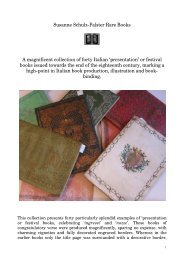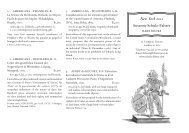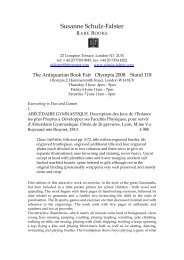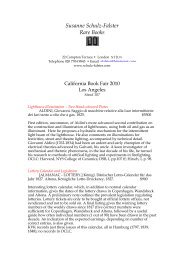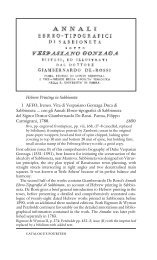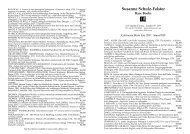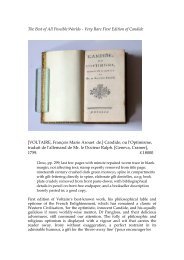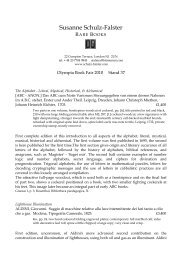Susanne Schulz-Falster Catalogue Ten - Schulz-Falster Rare Books
Susanne Schulz-Falster Catalogue Ten - Schulz-Falster Rare Books
Susanne Schulz-Falster Catalogue Ten - Schulz-Falster Rare Books
You also want an ePaper? Increase the reach of your titles
YUMPU automatically turns print PDFs into web optimized ePapers that Google loves.
Tarantella Dance<br />
278 SERAO, Francesco. Della Tarantola o sia Falangio di Puglia.<br />
Lezioni Accademiche. Napoli, 1742. £1800<br />
4to, pp. ii, 260; engraved title vignette and decorative initials; some<br />
browning and spotting throughout, due to paper quality; contemporary<br />
full vellum, gilt-lettering directly to spine.<br />
First edition, uncommon, of this medical and psychological assessment of<br />
the phenomenon of the Tarantola or Tarantella dance, a trance like ecstatic<br />
dance. The origin of this dance is found in a therapeutic ritual, carried out<br />
to fend oV the eVects of being bitten by the tarantola, the wolf-spider.<br />
Popular belief was that the bite of this spider caused a disease called<br />
‘tarantismo’, which led to a period of melancholy and ultimately death. The<br />
only way to avoid death was a frenzied, uncontrollable dance, set to music,<br />
and called the ‘tarantella’.<br />
Serao studies the phenomenon in depth, beginning with the natural history<br />
of the ‘tarantola’, with extensive reference to classical natural historians,<br />
contemporary reports, and scientif study. The second, more<br />
substantial, part is devoted to the study of the related frenzied dance, and its<br />
origin in popular superstition, mixed with the perceived eVects of the spider’s<br />
venom. Serao gathers the evidence, citing both medical literature and<br />
contemporary eyewitness reports. After careful consideration he maintains<br />
that the Tarantella cannot be wholely attributed to the venom of the spider,<br />
nor that it can have such a strikingly diVerent eVect on the people of Puglia.<br />
He comes to the conclusion that it is the music, that has the hypnotic eVect.<br />
The Tarantella has become a part of musical repertoire, and one of the better-known<br />
pieces, called ‘Antidotum Tarantulae’, the treatment for the spider<br />
bite is even incorporated into Tchaikowsky’s Swan Lake.<br />
Searo (1702–1783), one of the best-known naturalists and medical scientists<br />
of the Neapolitan Reign, member of the Paris Academy of Sciences<br />
and the London Royal Society.<br />
In Wellcome, RLIN and OCLC locate further copies at New York Public Library,<br />
the British Library and Edinburgh University.<br />
A Nation in Arms<br />
279 [SERVAN, Joseph.] Le Soldat Citoyen, ou Vues Patriotiques<br />
sur la Maniere la plus avantageuse de pourvoir à la Défense du<br />
Royaume ... Dans le Pays de la Liberté [Neufchâtel], 1780. £900<br />
8vo, pp. [iv], 640, [2] errata; decorative head and tail-pieces, numerous<br />
tables within the text; bound in contemporary full mottled calf, spine<br />
decoratively gilt in compartments, gilt-lettered spine label, extremities<br />
lightly rubbed, a Wne copy, with engraved armorial bookplate on verso<br />
of title.<br />
First edition of this revolutionary analysis of the position and function of<br />
the army within the state which culminates in the proposal of the citizen<br />
susanne schulz-falster rare books catalogue ten<br />
army, which became the standard after the revolution. The work has also<br />
been attributed to Guibert, the author of the well-known Traité de Tactique,<br />
but it appears to be conWrmed that this work is by Servan.<br />
Beginning with the proposition that the army should be useful for the<br />
state, not just in war but also in peace time, Servan Wrst analyses how troups<br />
are recruited, how they are supported, their remit and their discipline. His<br />
most important suggestions, however, concern the citizen soldier – when<br />
not needed for active duty, soldiers should work in agriculture and in public<br />
works projects. Furthermore they should be allowed to marry, which in<br />
turn would lead to population increase and beneWt both state and army.<br />
Some of his suggestions sound remarkably similar to those of Turgot as<br />
controller-general.<br />
Servan (1741–1808) was minister of war from 1792, and later on head<br />
of the Republican army. Denounced by Robespierre, he was imprisoned<br />
during the terror, but became head of the army in 1799.<br />
Barbier IV, 515, Cioranescu 18th, 31489; INED 4165; RLIN records copies at<br />
Stanford, Princeton, Yale, and Cornell; see Charnay, Jean Paul. Guibert ou le Soldat<br />
Philosophe, Chateau de Vincennes, 1981.<br />
280 SHERER, John. An Abridgement of Crabb’s Dictionary of<br />
English Synonymes. Penzance, E. Paddy, 1845. £60<br />
Tall 12mo, pp. [ii], iii, [i] blank, 114, some spotting; original<br />
publisher’s pink glazed cloth, rebacked, printed label to upper board;<br />
corners a little worn; contemporary ownership inscription on front<br />
paste-down and free endpaper.<br />
First abridged edition. Attractive Penzance printing of this dictionary of<br />
synonyms, abridged from Crabb’s dictionary, Wrst published in 1816.<br />
Words of similar or related meaning are presented together and their relative<br />
impact is explained.<br />
Not in Kennedy, who only lists a later publication by Sherer entitled The desk-book of<br />
English synonyms, (1864).<br />
281 SILVESTRE, Augustin-François de. Essai sur les moyens<br />
de perfectionner les Arts Economiques. Paris, Madame Huzard<br />
[1801]. £340<br />
8vo, pp. x, 11–176; recent half-calf over marbled boards, spine<br />
decoratively gilt.<br />
First edition of a detailed analysis of the use of agriculture within the French<br />
economy. Inspired by Chaptal’s Essai sur le perfectionnement des Arts<br />
chimique en France, Silvestre deplores the present state of agriculture in<br />
France. He sets out to improve the situation through education. Special<br />
schools are to be set up for all diVerent branches of economics and agriculture.<br />
In addition to this, model farms are to be set up as an inspiration to the<br />
local community, and botanical gardens and ‘economics museums’ are to be<br />
encouraged. Silvestre also promotes an oYce for translations so that pub-



